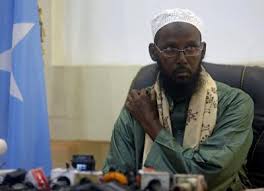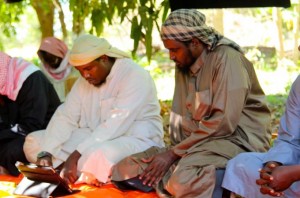WardheerNews Editorial
Wearing a military fatigue, Somalia’s new president, Mohamed Farmajo, recently vowed to eradicate Al-Shabaab within two years. Since February 2017, when Farmajo came to power, the militant group has escalated its bombing campaign in Mogadishu. Farmajo highlighted the necessary steps his government must take to root out the militant group, such as strengthening the national army, fighting corruption, demanding the lifting of the United Nations arms embargo on Somalia, and threatening to prosecute Mogadishu businesses for paying extortion money to Al-Shabaab. While these are lofty goals, the new administration faces major hurdles in accomplishing such objectives. Foremost among these is the fact that for political, structural, and military equipment reasons, the Somali army is not yet ready to fight the militant group effectively.
Political Conflicts

The Somali Army is not yet a national institution that represents the country’s multitude of clans. The current army is poorly equipped, lacks discipline, and is rarely paid regularly. President Farmajo has publicly called for a “mixed” army that reflects the country’s clan makeup. He has proposed the country’s regional states to each provide 3,000 soldiers to be part of the national army.
Moreover, there are several countries, including the U.A.E, Qatar, Turkey, and the United States, training different segments of the Somali army and security forces. These forces lack coordination in command and control, which has resulted in occasional armed skirmishes among the different forces.
Additionally, the US Government has played a major political role in Somalia’s conflict with Al-Shabaab. The American administration under Donald Trump recently upped the fight against the terrorist group by sending some troops to Somalia and increasing drone attacks. This has resulted in the death of the first American serviceman in Somalia since 1993. General Thomas Waldhauser, of the U.S. Africa Command, explained the difficulty of escalating the war against Al-Shabaab and the concern of turning that country into what he termed “a free-fire zone.”
Aside from the increased military response, the United States Government has lifted the $5- million bounty it had placed on Al-Shabaab leader, Mukhtar Robow. The Somali Government has secretly been negotiating with Robow for the past several years to persuade him to defect from the radical group. By withdrawing the bounty, Washington has removed a major hurdle in these negotiations.
Robow was one of the major leaders of the Al-Shabaab movement and held important posts in the group. He fought in Afghanistan and, through the years, cultivated important relationships with Al-Shabaab’s foreign jihadists. He belongs to the Rahanweyn clan, a militant group in which most of the foot soldiers are Rahanweyn.
However, since June 2013, Robow has been estranged from Al-Shabaab leadership due to serious conflicts he had with the radical group’s former Amir, Ahmed Abdi Godane, who was killed in a U.S. airstrike in 2014. Robow and his followers (about 300 to 400 fighters) have been holed up near Hudur in the Bakool region. They were neither part of Al-Shabaab nor at war with the Somali Government, The recent intensified war of al shabab to recapture Mr. Robow, had expedited his surrender to the Federal Government of Somalia through the facilitation of South West State officials. Mr. Robow was airlifted to Mogadishu on August 13 from Hudur in South–Western Somalia.
It is not clear what Robow wants as he has given no public demands. There are reports that he does not want to be placed under house arrest, like Hassan Dahir Aweys, or be forced to give interviews to the mass media, or be made available to Western Intelligence Agencies for debriefing. Robow is aware that once he defects, he has to go through a lengthy process of debriefing both by the Somali government and its allies like the US. However, he also might be trying to save face among jihadists so as not to be seen as a sellout. In reality, Al-Shabaab will use whatever means it has at its disposal to hunt him down or soil his reputation among jihadists.
What will happen to Al-Shabaab after Robow’s defection?
 Not much. Al-Shabaab technically lost Robow’s jihadi services almost 6 six years ago, but he was shrewd enough not to alienate the group. His defection is unlikely to cause fissures in the ranks of the group. Al-Shabaab fighters are first and foremost disciplined, loyal, and they obey the orders of their leadership. Clan loyalty is unlike to affect them. The radical group will continue its terrorist bombings. Although it has lost territories and international recruitment, Al-Shabaab still poses a major threat to Somalia.
Not much. Al-Shabaab technically lost Robow’s jihadi services almost 6 six years ago, but he was shrewd enough not to alienate the group. His defection is unlikely to cause fissures in the ranks of the group. Al-Shabaab fighters are first and foremost disciplined, loyal, and they obey the orders of their leadership. Clan loyalty is unlike to affect them. The radical group will continue its terrorist bombings. Although it has lost territories and international recruitment, Al-Shabaab still poses a major threat to Somalia.
Structural Problems
The Somali government’s struggle to define its security policy is undermining Counterterrorism objectives. Since the presidential elections in February, the national security portfolio led by the president has lagged due to the current capabilities of the Somali National Army.
The Somali army operates under the shadow of the 22,000-soldier force run by the African Union Mission in Somalia (AMISOM). This force from various African countries is better equipped, well fed, and well paid compared to the Somali army. For the past ten years, the AMISOM forces have played a crucial role in protecting the Somali government and its officials and driving out al-Shabaab from Mogadishu and other urban areas; however, AMISOM has not been effective in rooting out the radical group, which is only estimated to have less than 4,000 fighters. The AMISOM forces are scheduled to withdraw from Somalia in 2020, but the likelihood of that happening is dim because the Somali army is too far from being ready to take over the country’s security.
Military equipment challenges
Currently, the Somali army operates with light weapons due to an arms embargo on the country, an issue President Farmajo raised during the London Conference on Somalia two months ago. He highlighted the fact that the Somali army and Al-Shabaab fighters were both using the same weapons—AK 47s—in their war against each other. This parity, Farmajo lamented, puts the national army at a disadvantage, and he called for the lifting of the arms embargo. However, Boris Johnson, the UK’s Secretary of State for Foreign and Commonwealth Affairs, shot down the idea and called it impractical. “This is not the time to lift the arms embargo,” Johnson said, proposing instead the Somali army work hand-in-hand with the regional forces already in the country.
Solutions in Progress
Somalia’s National Security Council, led by Farmajo and includes the heads of regional governments, has recently drawn a new national security plan in which all the armed forces and security services will be united under one command and control. This was part of the security pact reached at the London Conference to help transition Somali forces to take over the security of the country from AMISOM no later than the end of 2017.
Farmajo has also proposed two non-military moves to combat Al-Shabaab: Amnesty and criminal prosecution of those who fund the group. In order to appeal to the many of the young people who are the backbone of Al-Shabaab’s fighters, Farmajo called for a 60-day amnesty for those who want to defect from the terror group. So far, only a small number of fighters have deserted the group.
In an attempt to disable Al-Shabaab’s funds, Farmajo’s government has passed a decree, the first of its kind, prohibiting Mogadishu businesses from paying extortion money to Al-Shabaab. The militant group has enjoyed significant support in Mogadishu, and many business conglomerates, merchants, and even some civil servants regularly pay “taxation” to the terror group. It is too early to tell if the decree will be implemented, but its execution seems unpractical without providing safeguards to the business people and citizens. First, there are sharia courts across southern Somalia administered by Al-Shabaab due to the absence of a government-run judicial system. Second, the extremist group operates inside Somalia, and also controls some parts of the country. Thus, the government is not in a position to protect its citizens from Al-Shabaab’s retaliations.
The Next Step
President Farmajo’s attempts to build the national army and financially strangle Al-Shabaab might only be a partial response in eliminating the group. There are other pertinent measures to fight the group that remain daunting and untouched. For instance, terror groups such as Al-Shabaab flourish in failed states like Somalia, Afghanistan, Iraq, and Libya where the central government is weak, corruption is rampant, and the rule of law is absent. Farmajo has promised to lead a transparent government that works closely with the federal parliament and regional states. He said, “Al-Shabaab leadership thrives when there is disunity among the country’s leaders.” However, when his administration recently presented an anti-corruption bill to parliament, it was rebuffed for needing further review.
Moreover, the country lacks a clear and consistent policy to deal with Al-Shabaab. On July 24, 2017, Al-Shabaab released seven humanitarian aid workers it had kidnapped in Baidoa, 150 miles from Mogadishu, in exchange for weapons. Rewarding the terror group with weapons is what keeps its life support and builds its capacity to conduct more sophisticated attacks. Farmajo might be better off tackling some of the basic issues that provide a lifeline to the terror group such as the lack of schools for the youth, lack of employment, absence of transparency, poor policing, and irregular payment of salaries for the army. Opening communication channels with Al Shabab to sway non-hardliners is also of paramount important to winning the war with the terror group.
WardheerNews
Email: [email protected]
Read more Editorial: WardheerNews Editorial Archives
We welcome the submission of all articles for possible publication on WardheerNews.com. WardheerNews will only consider articles sent exclusively. Please email your article today . Opinions expressed in this article are those of the author and do not necessarily reflect the views of WardheerNews.
WardheerNew’s tolerance platform is engaging with diversity of opinion, political ideology and self-expression. Tolerance is a necessary ingredient for creativity and civility.Tolerance fuels tenacity and audacity.
WardheerNews waxay tixgelin gaara siinaysaa maqaaladaha sida gaarka ah loogu soo diro ee aan lagu daabicin goobo kale. Maqaalkani wuxuu ka turjumayaa aragtida Qoraaga loomana fasiran karo tan WardheerNews.
Copyright © 2024 WardheerNews, All rights reserved


